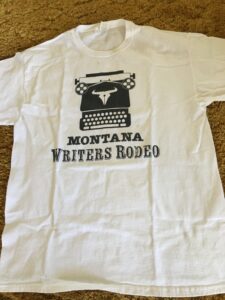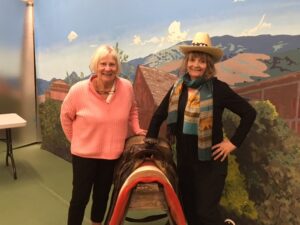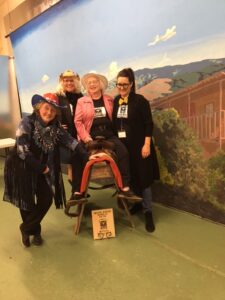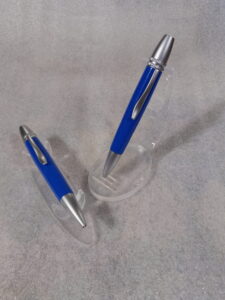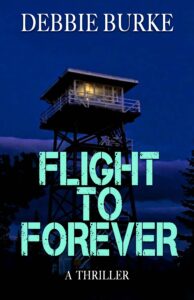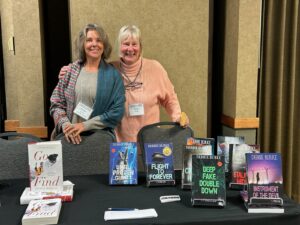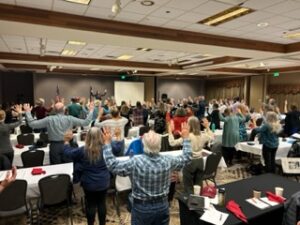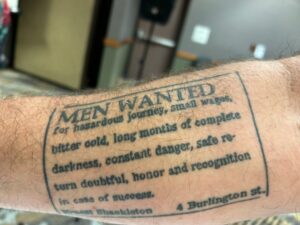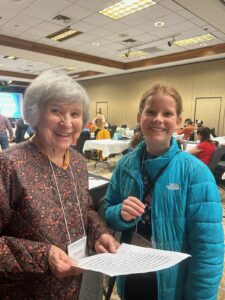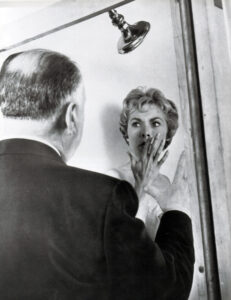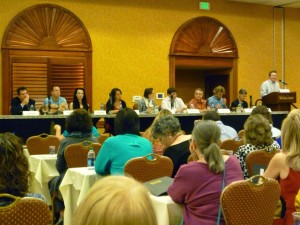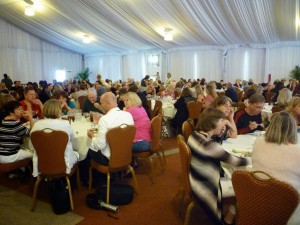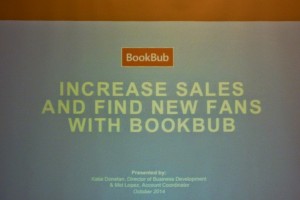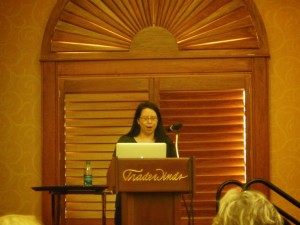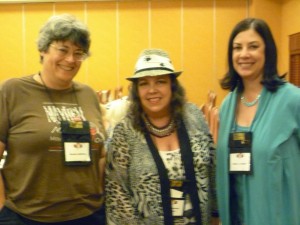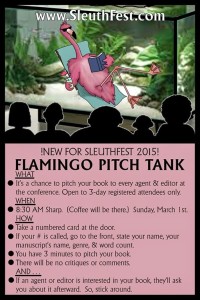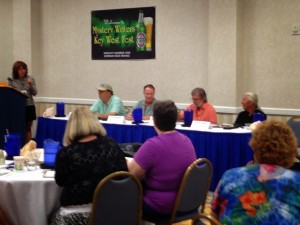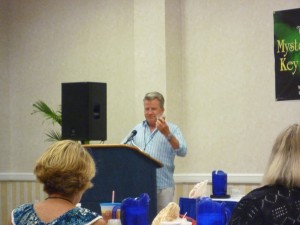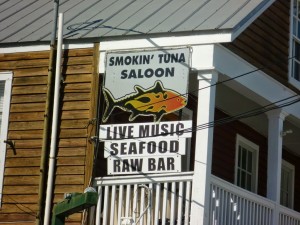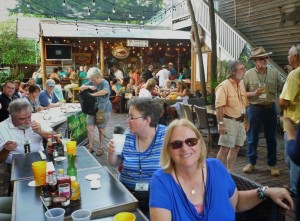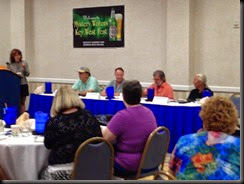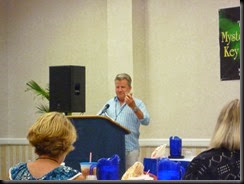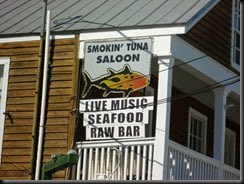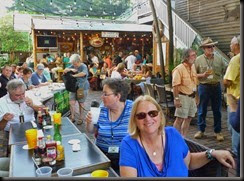by Debbie Burke
Welcome to Part 3 of the rundown on the Flathead River Writers Conference. If you missed anything, here are links to Part 1 and Part 2.
In Part 1, emcee Kathy Dunnehoff observed that normally introverted writers are “like dogs at the dog park,” ecstatic to be around other writers.
On Saturday evening, conference attendees congregated at the literary version of the dog park—the bookstore in downtown Kalispell. It was party time at The BookShelf.
Conference committee member Shira Marin laid out a sumptuous spread with wine, jumbo shrimp, cheeses, sandwiches, fruit, and more. We noshed and gabbed and renewed friendships from past conferences. Plus we met new folks who will likely become critique partners and beta readers.
Now back to the conference speakers…

Memoirist Robert Petrone
Robert Petrone developed an interest in memoir writing as a result of growing up with a father who spent 30 years in a nursing facility because of MS. Yet, the five Petrone children were not allowed to speak of his condition. Illness was considered shameful, and he felt burdened with guilt because of his father’s disability.
With a PhD in English Education, Robert is currently an associate professor at the University of Missouri and has been exploring memoir writing in depth.
He describes the “hallmark of memoir” as the “double perspective” of two voices. One is the external narration of events as they unfolded in the past. The second is the internal narration of looking back and reflecting on those events.
The memoirist has “two perspectives that equal two selves that equal two voices, then and now. One is the voice of innocence, the other is the voice of experience.”
In the first draft, the author relates scenes, dialogue, and thematic tension.
Robert likens the second draft to “therapy,” layering in the author’s realizations about the meaning of earlier events.
He suggested an excellent visual to help writers distinguish between the two voices: display a photo of yourself in the past beside a photo of yourself now.
Another trick Robert uses are color-coded index cards pinned to a wall. On one side is a summary of the external narration. On the other side is the internal narration about the event. Each character in the story is represented by a different colored index card. Robert’s visual aid ideas especially appealed to me since those options are low-tech and easy to use.
In addition to memoir, Robert’s research focuses on curriculum development for youth, especially in rural and Native American schools. That dovetails with Jake Arrowtop’s teaching at a high school on the Blackfeet Reservation, covered in Part 2. Between their sessions, Robert and Jake found much to talk about.
~~~
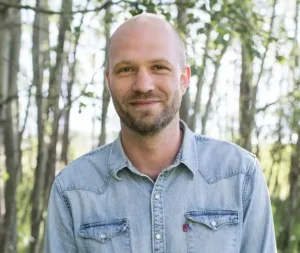
Jonathan Fetter-Vorm
Jonathan Fetter-Vorm is a self-taught graphic artist, driven by his love of drawing. He admits, “Until I had a family, my lifestyle was very unhealthy, eating junk food and drawing sixteen hours a day.”
Although his father dismissed his art as “fatuous indulgence,” Jonathan’s early passion wasn’t quashed. In college, after reading Beowulf, he turned the epic poem into a comic book.
He opted for an MFA in creative nonfiction rather than going to art school because he says “art school doesn’t teach art.”
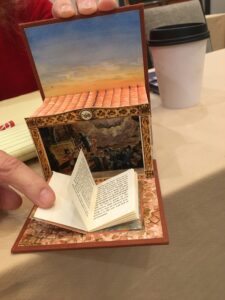
Pop up classic book by Jonathan Fetter-Vorm
Working as a book printer and binder, he created beautiful handmade illustrated books. During his talk, he passed around several examples of miniature pop-up books with exquisite artwork that retold classic literature. But he says, “I couldn’t make any money doing that.”
Writing as a career discouraged him so he quit. “I turned to comic books and started making money.”
He found a niche market of young readers fascinated by his illustrated recounting of historical events like the Civil War (Battle Lines), and the Apollo 11 moon landing (Moonbound). In 2013, his story Trinity was selected by the American Library Association as the Best Graphic Novel for Teens. In it, Jonathan chronicles J. Robert Oppenheimer and the building of the first atomic bomb.
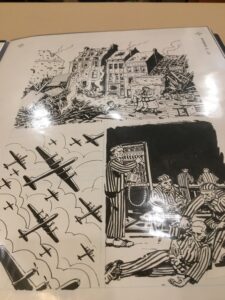 He describes his meticulous research, which includes near-microscopic study of photos and original documents to ensure every detail is accurate, down to the cabin measurements in Apollo 11. He used Kodachrome photos from the 1960s for the color palette as well as to capture clothing, hairstyles, appliances, and objects from everyday life in 1969.
He describes his meticulous research, which includes near-microscopic study of photos and original documents to ensure every detail is accurate, down to the cabin measurements in Apollo 11. He used Kodachrome photos from the 1960s for the color palette as well as to capture clothing, hairstyles, appliances, and objects from everyday life in 1969.
To build a graphic novel, Jonathan suggests three methods:
- Start from a script then add drawings;
- Start with character sketches;
- Start with a scene.
His preferred style is to draw first. “If I could, I would draw until I had a heart attack.”
If he tries to write the script first, he jokes about his constant distractions: “I need a snack. I need to go to the bathroom.”
A 150-page book contains six panels per page, requiring a lot of detailed drawing. However, he says, “You really only need three to five truly impactful scenes.”
I left Jonathan’s talk with a fresh appreciation for comic books and the creativity behind them.
~~~
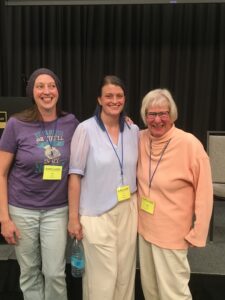
Jess Owen, J.D. (Jenn) Evans, Debbie Burke
How much fun is it to have a sibling who’s also a writer? Ask J.D. (Jenn) Evans who is Jess Owen’s sister. For much of their lives, the sisters have brainstormed, critiqued, and beta read each other’s work.
Jenn is a former Army officer now living in North Carolina with her husband and “two attempts at mini-clones gone rogue.” She laughingly complains she has “too many stories in her head.”
Jenn writes a romantic epic fantasy series, Mages of the Wheel, that unfolds in the World of Tamar. Her books have garnered thousands of four and five-star reviews and are rated as “#Best of Booktok.” Readers become entranced by the magical world thanks to beautifully rendered maps of various story locales.
She actively engages with her readers on multiple social media outlets and has a large loyal following. Fans even share their own art that depicts Jenn’s characters.
Because of overlapping breakout sessions, I missed Jenn’s presentation about how to create relationship chemistry. But Jenn, Jess, and I got together for a panel as the last event on Sunday afternoon.
Usually, that time slot means many attendees have already left but a fair number of people remained to hear us discuss our different journeys in the traditional and indie publishing world.
Jenn indie-published her romantasy series but remains open to other routes if good opportunities come around.
Jess used crowd-funding to indie-publish her first four books, The Summer King Chronicles, a fantasy series with lush illustrations. Her next two books were contemporary YA. A Furry Faux Paw and Don’t Ask if I’m Okay were traditionally published. She is considering a return to indie pub for future books.
My first thriller Instrument of the Devil was traditionally published but six months later the press closed its doors. I received a couple of offers from small publishers but decided to get my rights back for the first book and have indie-pubbed all my books since. The control and ability to release books on my timeframe is important, rather than waiting for the much slower traditional process.
We all agreed that the marketing burden falls on the author, no matter how they’re published.
Jenn and Jess are both active on numerous social media outlets. I always learn about that unfamiliar territory by listening to them.
Jenn discussed that today’s authors must be able to pivot, whether they’re traditionally or indie published. Readers’ tastes and trends often change quickly. Indie publishing allows Jenn to switch directions and adapt immediately to her readers’ wants.
Newer publishing options continue to evolve with online outlets like Royal Road, a fan-driven site of serializations. I’d heard an enthusiastic buzz at the conversation among younger attendees about Royal Road.
Jess and Jenn are always lively, intelligent, and knowledgeable. Being on a panel with the two sisters was great fun.
~~~
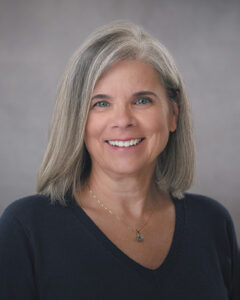
Claudia Cassidy Bennett, PhD
The conference could not have happened without the steady guiding hand of chair Claudia Bennett. Whether she was juggling plane flights for out-of-town presenters or finding a missing dongle for my power point presentation, Claudia handled all challenges with serene graciousness and efficiency.
Perhaps she perfected that calmness while caring for her mother who had Alzheimer’s. She memorialized the experience in her touching book Caregiving Reimagined: A Practical and Spiritual Guide for Family Caregivers.
Sunday evening, the 35th Annual Flathead River Writers Conference wrapped. Tired but energized attendees hurried home to apply lessons, insights, and renewed inspiration to our works in progress.
Hope to see you in Montana next year!

















